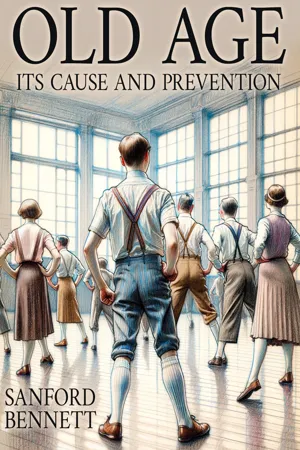
- English
- ePUB (mobile friendly)
- Available on iOS & Android
eBook - ePub
Old Age, Its Cause and Prevention
About this book
Bennett was born in Philadelphia. He invented an extensive exercise regime of self-care that involved muscular contraction and relaxation exercises for rejuvenating the body. His ideas were popularized in the San Francisco Chronicle in 1906 and in two books.
Bennett added medical diagrams of the muscles and organs of the body to his descriptions of exercise routines. Bennett claimed that his exercise regime gave him youthful vigour and made him healthy and stronger. His exercises could be carried out in bed for a quarter or half-hour.
Frequently asked questions
Yes, you can cancel anytime from the Subscription tab in your account settings on the Perlego website. Your subscription will stay active until the end of your current billing period. Learn how to cancel your subscription.
No, books cannot be downloaded as external files, such as PDFs, for use outside of Perlego. However, you can download books within the Perlego app for offline reading on mobile or tablet. Learn more here.
Perlego offers two plans: Essential and Complete
- Essential is ideal for learners and professionals who enjoy exploring a wide range of subjects. Access the Essential Library with 800,000+ trusted titles and best-sellers across business, personal growth, and the humanities. Includes unlimited reading time and Standard Read Aloud voice.
- Complete: Perfect for advanced learners and researchers needing full, unrestricted access. Unlock 1.4M+ books across hundreds of subjects, including academic and specialized titles. The Complete Plan also includes advanced features like Premium Read Aloud and Research Assistant.
We are an online textbook subscription service, where you can get access to an entire online library for less than the price of a single book per month. With over 1 million books across 1000+ topics, we’ve got you covered! Learn more here.
Look out for the read-aloud symbol on your next book to see if you can listen to it. The read-aloud tool reads text aloud for you, highlighting the text as it is being read. You can pause it, speed it up and slow it down. Learn more here.
Yes! You can use the Perlego app on both iOS or Android devices to read anytime, anywhere — even offline. Perfect for commutes or when you’re on the go.
Please note we cannot support devices running on iOS 13 and Android 7 or earlier. Learn more about using the app.
Please note we cannot support devices running on iOS 13 and Android 7 or earlier. Learn more about using the app.
Yes, you can access Old Age, Its Cause and Prevention by Sanford Bennett in PDF and/or ePUB format, as well as other popular books in Biological Sciences & Sport & Exercise Science. We have over one million books available in our catalogue for you to explore.
Information
Table of contents
- From 1841 to 1912
- Why I Have Written This Book
- Clinical Report
- Old Age—Its Cause and Prevention
- The Will in Exercising
- Exercising in Bed
- Thirty Exercises
- Things to Be Remembered
- Sunlight and Fresh Air
- The Fasting Cure
- The Secret of Good Digestion
- Dyspepsia
- How I Strengthened My Eyes
- The Liver
- Deep-Breathing Exercises for the Development of the Lungs
- Cleanliness Internal
- Cleanliness External
- Rheumatism
- Varicose Veins in the Legs—the Cause and the Cure
- Concerning Various Methods Proposed to Defer Old Age
- The Subconscious Mind, Its Influence Upon the Body, and Why Christian Science Cures
- Adverse Criticisms of the Author’s Statements on Christian Science
- The Duration of Human Life
- The Hair
- The Reduction of an Obese Abdomen
- Exercises for the Reduction of an Obese Abdomen
- The Rejuvenation of the Face, Throat and Neck
- Developing the Muscles Covering the Chin and Jaws
- The Muscles of the Cheeks
- Making Old Faces Young
- Massage Exercise for Developing the Cheeks
- Massage for the Muscles of the Chin
- Rapid Development of the Supporting Muscles of the Cheeks
- The Lines of Age
- The Muscles of the Throat
- Developing the Muscles of the Throat—Third Exercise
- Ninon de L’Enclos “The Woman Who Never Grew Old”
- Muscles of the Back of the Neck and the Abdominal Muscles
- The Skin
- Exercising the Muscles Which Cover the Shoulder Blades
- Exercise for the Development of the Throat Muscles
- The Neck
- Exercise for Developing and Strengthening the Neck
- Developing the Sides of the Neck
- Dumb-Bell Exercise for Two Hands
- Dumb-Bell Exercise In Combination with Massage of the Biceps and Triceps Muscles
- Stretching Board Device for Broadening the Shoulders
- Exercise for Broadening the Shoulders
- Exercise for Developing the Muscles Covering the Shoulder Blades
- Exercise for the Development of the Legs The Climbing Muscles
- Development of the Muscles of the Legs (Continued)
- Exercise for Strengthening the Loins
- Exercise for Strengthening the Lower Abdominal Muscles
- Exercise for Developing the Muscles of the Sides and Loins
- Tensing Exercise for the Whole Body
- Single Arm Pulling Exercise
- Pulling Exercise, for Strengthening the Muscles of the Back and Loins
- Exercise for Developing the Back and Shoulder Muscles
- Resistance Exercise for Developing the Fore-Arms
- Resistance Exercise for Developing the Arms
- Twisting Exercise for the Development of the Arms
- Exercise for Developing the Triceps or Back Muscles of the Arms
- Exercise for the Hips and Loins
- Percussion Exercise for Strengthening the Abdominal Muscles and Improving Digestion
- Bar Exercise No. 1 Exercise Number 1 for the Development of the Muscles of the Arms and Shoulders
- Bar Exercise Number 2 Similar to the Foregoing Exercise, with the Exception that but One Hand Is Used
- The Lifting Board
- Man’s First Physical Culture System
- In Conclusion